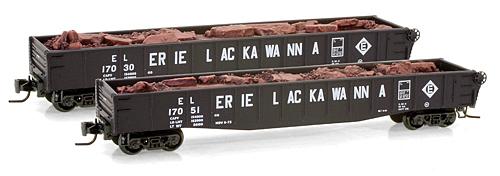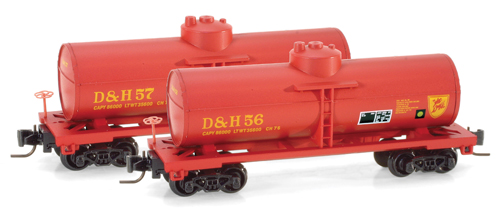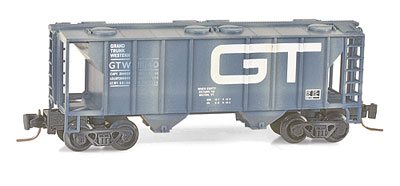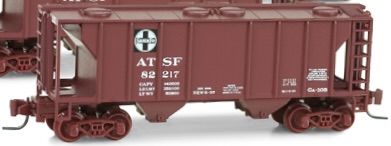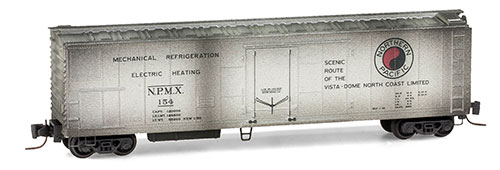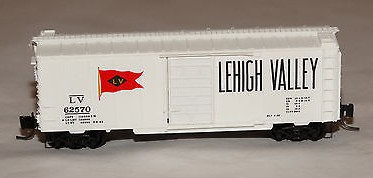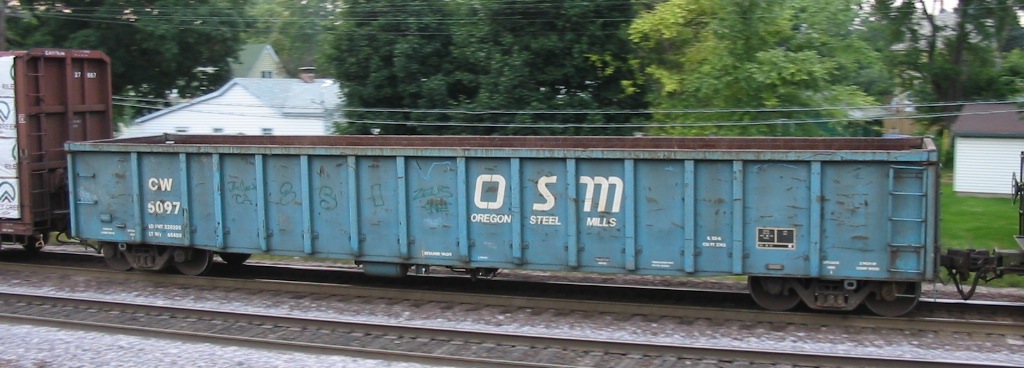Micro-Trains - 522 00 172 - Gondola, 50 Foot, Steel - Erie Lackawanna - 17051
Click to see the details
market
| Brand | Micro-Trains |
| Stock Number | 522 00 172 |
| Secondary Stock Number | 522 00 172 |
| Original Retail Price | $21.10 |
| Manufacturer | Micro-Trains |
| Body Style | Micro-Trains Gondola 50 Foot Steel |
| Prototype Vehicle | Gondola, 50 Foot, Steel (Details) |
| Road or Company Name | Erie Lackawanna (Details) |
| Reporting Marks | EL |
| Road or Reporting Number | 17051 |
| Paint Color(s) | Black |
| Print Color(s) | White |
| Coupler Type | Micro-Trains |
| Coupler Mount | Truck-Mount |
| Wheel Type | Injection Molded Plastic |
| Release Date | 2008-09-01 |
| Item Category | Rolling Stock (Freight) |
| Model Type | Gondola |
| Model Subtype | 50 Foot |
| Model Variety | Steel |
| Region | North America |
| Prototype Era | NA Era III: Transition (1939 - 1957) |
Prototype History:
In US railroad terminology, a gondola is an open-topped rail vehicle used for transporting loose bulk materials. Because of their low side walls, gondolas are also suitable for the carriage of such high-density cargoes as steel plates, steel coils, and bulky items such as prefabricated sections of rail track. For weather-sensitive loads, these gondolas are often equipped with covers.
All-steel gondolas date back to the early part of the 20th century. However, most of the early ones were shorter and used 40' designs. The ubiquitous 50' steel gondola we see modeled so often today are typical of railcars produced since the end of the second world war. In the late 1940s, steel became once again readily available and new, longer gondolas were produced to transport material for America's booming economy. Generally, these 50 foot cars have a capacity of 70 tons and were actually 52'6" long. The first models of this design were produced by the Erie Railroad and the Greenville Steel Car Co, but nearly identical cars were produced by Pullman, ACF and Bethlehem.
All-steel gondolas date back to the early part of the 20th century. However, most of the early ones were shorter and used 40' designs. The ubiquitous 50' steel gondola we see modeled so often today are typical of railcars produced since the end of the second world war. In the late 1940s, steel became once again readily available and new, longer gondolas were produced to transport material for America's booming economy. Generally, these 50 foot cars have a capacity of 70 tons and were actually 52'6" long. The first models of this design were produced by the Erie Railroad and the Greenville Steel Car Co, but nearly identical cars were produced by Pullman, ACF and Bethlehem.
Road Name History:
The Erie Lackawanna Railway (reporting mark EL), known as the Erie Lackawanna Railroad until 1968, was formed from the 1960 merger of the Erie Railroad and the Delaware, Lackawanna & Western Railroad. The official motto of the line was "The Friendly Service Route".
Like many railroads in the northeast already financially vulnerable from the expanding U.S. Interstate Highway System, the line was severely weakened fiscally by the extent, duration and record flood levels due to Hurricane Agnes in 1972. It would never recover, and most of the corporation's holdings were subsumed into the federal rescue purchases creating Conrail in 1976, ending its days as an operating railroad company.
Read more on Wikipedia.
Like many railroads in the northeast already financially vulnerable from the expanding U.S. Interstate Highway System, the line was severely weakened fiscally by the extent, duration and record flood levels due to Hurricane Agnes in 1972. It would never recover, and most of the corporation's holdings were subsumed into the federal rescue purchases creating Conrail in 1976, ending its days as an operating railroad company.
Read more on Wikipedia.
Brand/Importer Information:
 Micro-Trains Line split off from Kadee Quality Products in 1990. Kadee Quality Products originally got involved in N-Scale by producing a scaled-down version of their successful HO Magne-Matic knuckle coupler system. This coupler was superior to the ubiquitous 'Rapido' style coupler due to two primary factors: superior realistic appearance and the ability to automatically uncouple when stopped over a magnet embedded in a section of track. The success of these couplers in N-Scale quickly translated to the production of trucks, wheels and in 1972 a release of ready-to-run box cars.
Micro-Trains Line split off from Kadee Quality Products in 1990. Kadee Quality Products originally got involved in N-Scale by producing a scaled-down version of their successful HO Magne-Matic knuckle coupler system. This coupler was superior to the ubiquitous 'Rapido' style coupler due to two primary factors: superior realistic appearance and the ability to automatically uncouple when stopped over a magnet embedded in a section of track. The success of these couplers in N-Scale quickly translated to the production of trucks, wheels and in 1972 a release of ready-to-run box cars.
Micro-Trains Line Co. split off from Kadee in 1990 to form a completely independent company. For this reason, products from this company can appear with labels from both enterprises. Due to the nature of production idiosyncrasies and various random factors, the rolling stock from Micro-Trains can have all sorts of interesting variations in both their packaging as well as the products themselves. When acquiring an MTL product it is very important to understand these important production variations that can greatly enhance (or decrease) the value of your purchase.

Micro-Trains Line Co. split off from Kadee in 1990 to form a completely independent company. For this reason, products from this company can appear with labels from both enterprises. Due to the nature of production idiosyncrasies and various random factors, the rolling stock from Micro-Trains can have all sorts of interesting variations in both their packaging as well as the products themselves. When acquiring an MTL product it is very important to understand these important production variations that can greatly enhance (or decrease) the value of your purchase.
Item created by: gdm
on 2019-03-26 08:44:25
If you see errors or missing data in this entry, please feel free to log in and edit it. Anyone with a Gmail account can log in instantly.
If you see errors or missing data in this entry, please feel free to log in and edit it. Anyone with a Gmail account can log in instantly.


